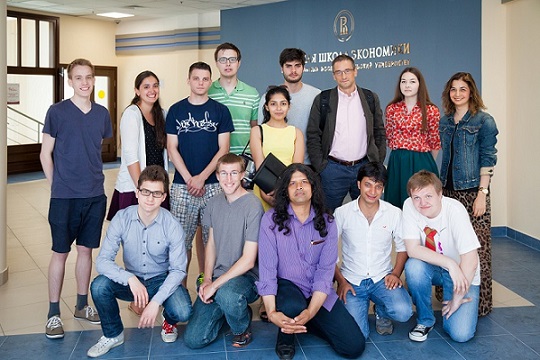Faculty of Computer Science to Offer Courses during HSE Summer University

For beginner-level students, the programme provides a possibility to get an introduction into a variety of different fields in Computer Science. However, even an experienced student can find a lot of new and interesting in the program.
The participants of the programme are expected to have basic programming experience and basic knowledge of mathematics. Individual courses may have additional prerequisites specified in their descriptions.
Automata, Nets and Applications in Software Engineering
Senior Lecturer at the Department of Software Engineering
The main practical goal of the course is to teach students the basics of automata and net theories with application in the fields of translators and distributed systems development. As the result students will learn how to systematically design and implement translators, and they will develop their first compiler and distributed system. Automata and net theories have many application in other field of computer science. We have chosen translators and distributed systems as they were always considered as the black art of programming. The students will see how beautiful theoretical constructions enable them to construct serious industrial software. The course will also prepare students for the OMG MDA software development methodology.
Introduction to Artificial Intelligence: Methods, Models, Algorithms
Professor, Mathematical Methods of System Analysis: Joint Department with the Research Institute of System Analysis (RAS)
Senior Lecturer, Mathematical Methods of System Analysis: Joint Department with the Research Institute of System Analysis (RAS)
The course will introduce the basic concepts of Artificial Intelligence: knowledge representation models, state space search strategies, basic machine learning techniques, AI-planning etc. Such areas of applications as natural language processing, robotics and others will be explored.
Introduction to Theory of Statistical Diagnosis
Professor, Mathematical Methods of System Analysis: Joint Department with the Research Institute of System Analysis (RAS)
The course will introduce the basic concepts of Statistical Diagnosis. This field of mathematical statistics deals with the following problems:
a) detecting changes in probabilistic characteristics of random processes (fields) in off-line regime
b) detecting changes in probabilistics characteristics of random processes (fields) in on-line regime.
These problems arise in many applications and are known in the literature as “change-point detection problems”. The goal of the course is to present to students the main ideas of non-parametric statistical diagnosis.
Computability and Complexity
Associate Professor at the Big Data and Information Retrieval School
The goal of the course is to provide an introduction to the theory of computation. It can serve as a theoretical basis for students interested in more practical areas of Computer Science as well as a starting course for further studies in Theoretical Computer Science. The course consists of two parts, one devoted to computability and another one to complexity. The two parts can be taken separately.
Introduction to Natural Language Processing
Lecturer at the School of Data Analysis and Artificial Intelligence
Lecturer at the School of Data Analysis and Artificial Intelligence
This is an introductory course to natural language processing. We will present the basic NLP problems such as key phrases extraction, morphological and syntactical parsing. To spice things up we will pay attention to some novel approaches in latent topic detection and distributional semantics. The practical part of the course includes working with publicly available software NLTK, StanfordNLP, gensim for solving these problems. Programming skills are welcome, but not strongly required. We will give introductory knowledge of programming languages Python and R to help a student in doing their computations on their own. We will take into account individual skills and interests of the students.
Ekaterina Artemova
Boris Darkhovsky
Leonid W. Dworzanski
Gennady Osipov
Vladimir V. Podolskii
